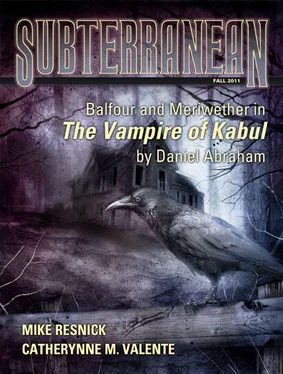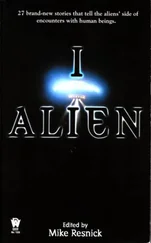Mike Resnick - Shaka II
Здесь есть возможность читать онлайн «Mike Resnick - Shaka II» весь текст электронной книги совершенно бесплатно (целиком полную версию без сокращений). В некоторых случаях можно слушать аудио, скачать через торрент в формате fb2 и присутствует краткое содержание. Год выпуска: 2011, Издательство: Subterranean Press, Жанр: Фантастика и фэнтези, на английском языке. Описание произведения, (предисловие) а так же отзывы посетителей доступны на портале библиотеки ЛибКат.
- Название:Shaka II
- Автор:
- Издательство:Subterranean Press
- Жанр:
- Год:2011
- ISBN:нет данных
- Рейтинг книги:3 / 5. Голосов: 1
-
Избранное:Добавить в избранное
- Отзывы:
-
Ваша оценка:
- 60
- 1
- 2
- 3
- 4
- 5
Shaka II: краткое содержание, описание и аннотация
Предлагаем к чтению аннотацию, описание, краткое содержание или предисловие (зависит от того, что написал сам автор книги «Shaka II»). Если вы не нашли необходимую информацию о книге — напишите в комментариях, мы постараемся отыскать её.
Shaka II — читать онлайн бесплатно полную книгу (весь текст) целиком
Ниже представлен текст книги, разбитый по страницам. Система сохранения места последней прочитанной страницы, позволяет с удобством читать онлайн бесплатно книгу «Shaka II», без необходимости каждый раз заново искать на чём Вы остановились. Поставьте закладку, и сможете в любой момент перейти на страницу, на которой закончили чтение.
Интервал:
Закладка:
“What are you buying from the American?” I said.
He reached into a desk drawer and pulled out a shining model of the latest starfaring military ship, much advanced over the type he’d served on less than a decade ago.
“You’ve bought a starship?” I asked incredulously.
He chuckled in amusement. “For plundering an entire country for half a century? I am a better bargainer than that, my brother.” He paused. “The American is here today, but Hlatshwayo tells me the stars are not yet in the proper alignment. Tomorrow I will meet with him and finalize the purchase of an entire fleet of starships,” he concluded proudly.
“And what of Botswana?” I asked.
“It has been here for a thousand centuries or more,” he replied. “It has lived its life. It is the past.” He pointed a forefinger toward the ceiling, and beyond that, the sky. “The future is out there - a million worlds for the taking.”
“And if someone objects to your just going out and taking them?” I asked.
“That is their choice,” he said with no show of concern. “Mine has already been made.”
At that instant I didn’t know who I felt sorrier for—Botswana or the galaxy.
10.
As Tchaka was building his fleet, two of our colonies—one on Delta Pavonis, one on Cygni 2—came under attack. For weeks we didn’t know who was responsible for it. Then our experts discovered that they were a previously-unknown race from DX Cancri.
Earth mobilized, and soon assembled a fleet of some three thousand ships under the leadership of the brilliant American commander, Dolores Sanchez—and Tchaka announced that South Africa would join the fleet with an independent force of our own.
Word came back quickly. The military thanked Tchaka for his offer, but all ships would be under the command of Admiral Sanchez.
Tchaka’s response was direct and to the point:
I take orders from no one. Do you want us to fight your enemy or don’t you?
From Planetary Command:
These are your enemies too.
And from Tchaka:
They have not harmed South Africa or any of its possessions. We are an independent nation, beholden to no one, and we choose our own enemies. If you want our help, you know our terms.
There was no official reply.
“They want us,” said Tchaka. “They just don’t want to admit it.”
“How can you be so sure?” I asked.
“Because if they didn’t need us, they would reject my offer without hesitation.” He smiled. “It is good to know our enemy’s weaknesses.”
“Our enemy is out there,” I said, pointing to the stars.
He sighed and shook his head sadly. “You are so slow to learn, my brother.”
“Learn what?”
“They are all our enemies,” he replied.
“How can you say that?” I said.
“They are not Zulus,” he answered, as if that explained it all.
Over the next month we began testing our new ships and recruiting crews for them. We received no official communication from Earth’s united military command, but word reached us through unofficial channels that when we were ready, they would prefer us to concentrate on Delta Pavonis.
“Of course they would,” said Tchaka with a sardonic smile.
“Why do you say it like that?” asked an aide.
“It’s almost twice as far from Earth as Cygni 2,” he replied. “It will require twice as much fuel, if we run into trouble it will take reinforcements twice as long to come to our aid, and for all we know the main body of the enemy fleet is there. When they evaluate their forces, you may be sure that we are the most expendable.”
“So do we accommodate the military, or do we go to Cygni-2?” asked another aide.
“In either location there will be hundreds, perhaps thousands, of ships from Earth. I have no intention of being a cog in their war machine.” He paused. “Every army and navy must have a supply line. We’ll patrol the least likely route between DX Cancri and Delta Pavonis.”
“The least likely?” asked the aide, frowning in puzzlement.
“If I know the enemy requires supplies, don’t you think Commander Sanchez knows it too, and will patrol all the likely shipping lanes between the planets?”
“If we choose the wrong route, won’t she think we are trying to avoid the battle?”
Tchaka stared at him until he began shifting his weight nervously. “If even you now know that she will patrol the likeliest routes, surely the enemy knows it—and knowing it, will choose the least likely routes, where we will be waiting for them.” He paused. “The government will dispense with your services as of this minute. I will not have anyone demonstrably stupid offering me advice.”
“But—”
“You heard me.”
The aide turned and left.
“I hope there are no more like him,” Tchaka announced to the room. “I think I may kill the next one.”
Nobody laughed.
11.
It was three days later, as Tchaka held a preliminary meeting with his officers, that a Colonel Mbatha tried to kill him.
Mbatha had the computer cast a Tri-D map of the neighboring twenty light-years, perhaps five feet on a side, top and bottom, into the middle of the room. Tchaka was indicating the routes he wanted them to patrol, where he wanted them to station their ships, when Mbatha pulled out a ceramic dagger, which hadn’t registered on the security devices, and tried to stab him between the shoulder blades.
I don’t know how he knew it—there was no reflection in the galactic map, and Mbatha was absolutely silent—but Tchaka turned just as the colonel’s hand was coming down. His own hand shot out, grabbed Mbatha by the wrist, and the two of them stood, motionless, for a few seconds. Then there was a loud cracking sound, Mbatha screamed, and the knife fell to the floor.
Tchaka placed his hands around Mbatha’s throat, and Mbatha tried to pull his hands apart. Again, the two were motionless, this time for almost a full minute. Mbatha’s eyes began bulging, and his attempts to free himself grew first more frantic, then progressively weaker. Tchaka stood still as a statue, no expression at all on his face, his fingers turning pale from the pressure he put on them. Then Mbatha went limp, and Tchaka let him fall to the floor.
He turned to another officer. “Shoot him,” he said.
The man stared at him, startled, but didn’t pull his laser pistol.
“He may not be dead yet,” said Tchaka. “Am I expected to show him mercy so that he can try to kill me again?”
The officer withdrew his pistol, pointed it at Mbatha, but did not fire. “I think he’s dead, sir. I see no sign of breathing.”
Tchaka walked over, took the pistol from him, and fired a blast of solid light into the back of Mbatha’s head.
“Now he is dead,” announced Tchaka. He turned the pistol onto its owner, aimed it between his eyes, and fired again.
There was a stunned silence among the other officers.
“He would not obey me with an incapacitated enemy,” said Tchaka coldly. “How could I—or you—trust him to do his duty against any enemy that was preparing to engage him in battle?” Another pause. “We will continue our briefing tomorrow.”
They filed out, and he signaled me to remain behind.
“That was the second,” he said when we were alone in the room.
“There was another?” I said, surprised.
“Two days ago.” He seemed unconcerned. “There will be more.”
“We must double—no, triple—the guard around you,” I said.
He shook his head. “I am more capable of protecting myself than any half-dozen men I could assign to the task. I just want you to know that it has happened, and it will happen again.”
I stared at him curiously, unable to see where this was leading.
Читать дальшеИнтервал:
Закладка:
Похожие книги на «Shaka II»
Представляем Вашему вниманию похожие книги на «Shaka II» списком для выбора. Мы отобрали схожую по названию и смыслу литературу в надежде предоставить читателям больше вариантов отыскать новые, интересные, ещё непрочитанные произведения.
Обсуждение, отзывы о книге «Shaka II» и просто собственные мнения читателей. Оставьте ваши комментарии, напишите, что Вы думаете о произведении, его смысле или главных героях. Укажите что конкретно понравилось, а что нет, и почему Вы так считаете.












